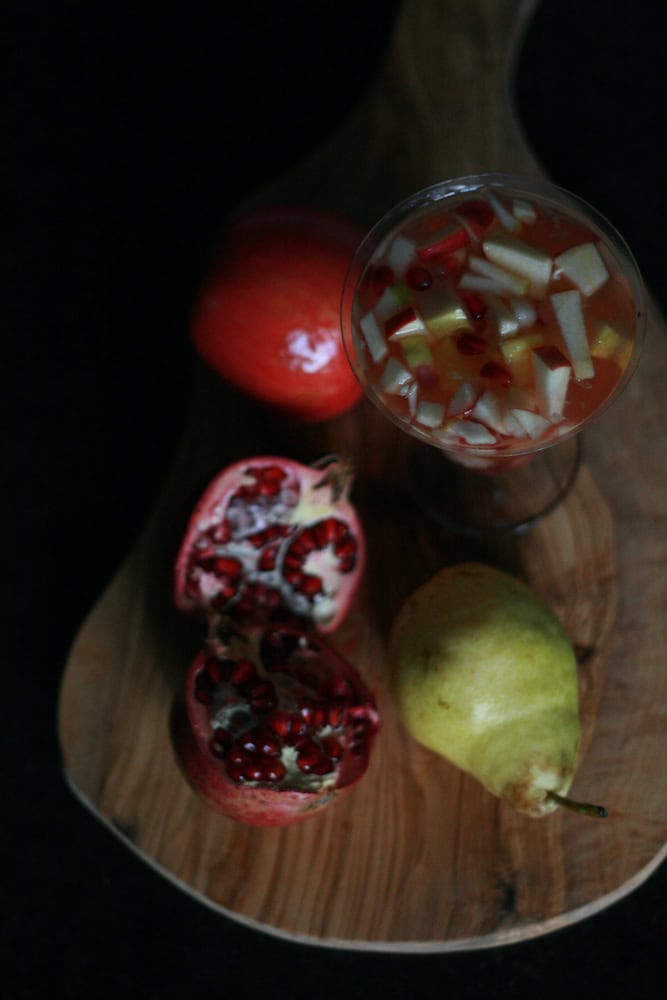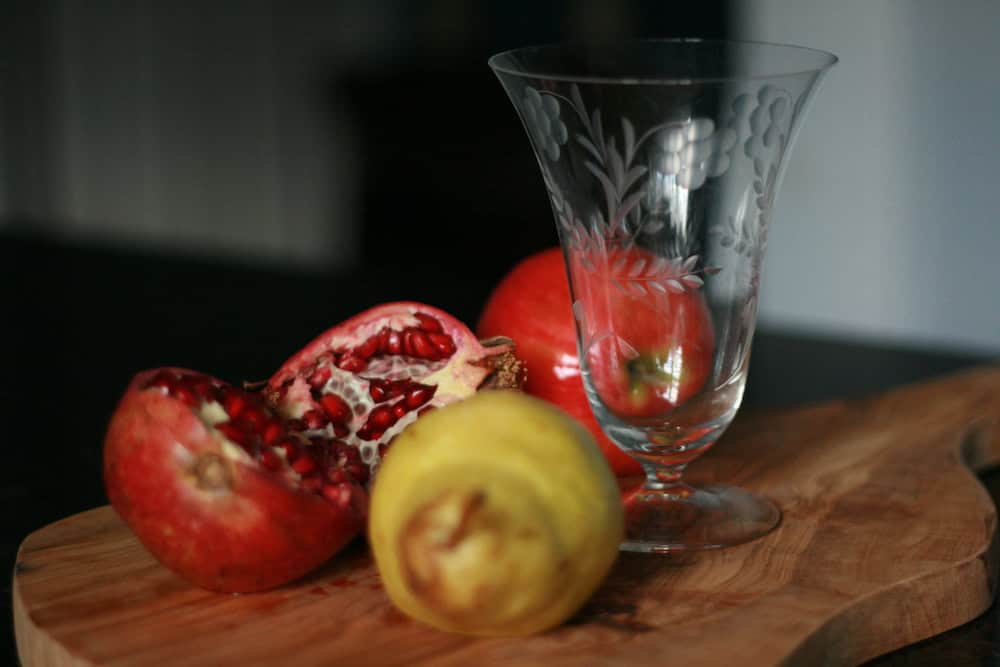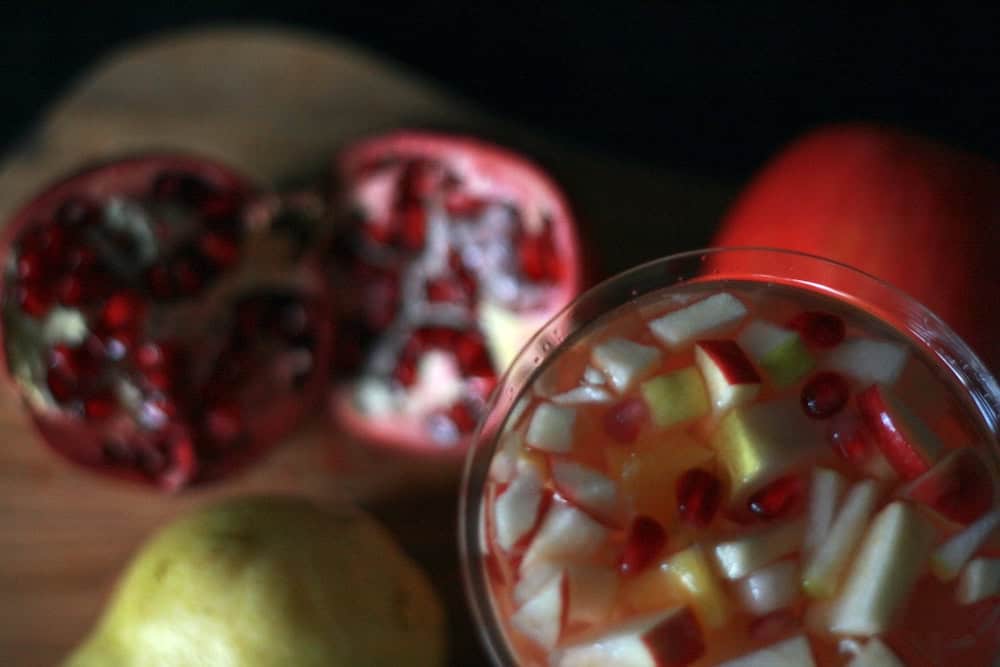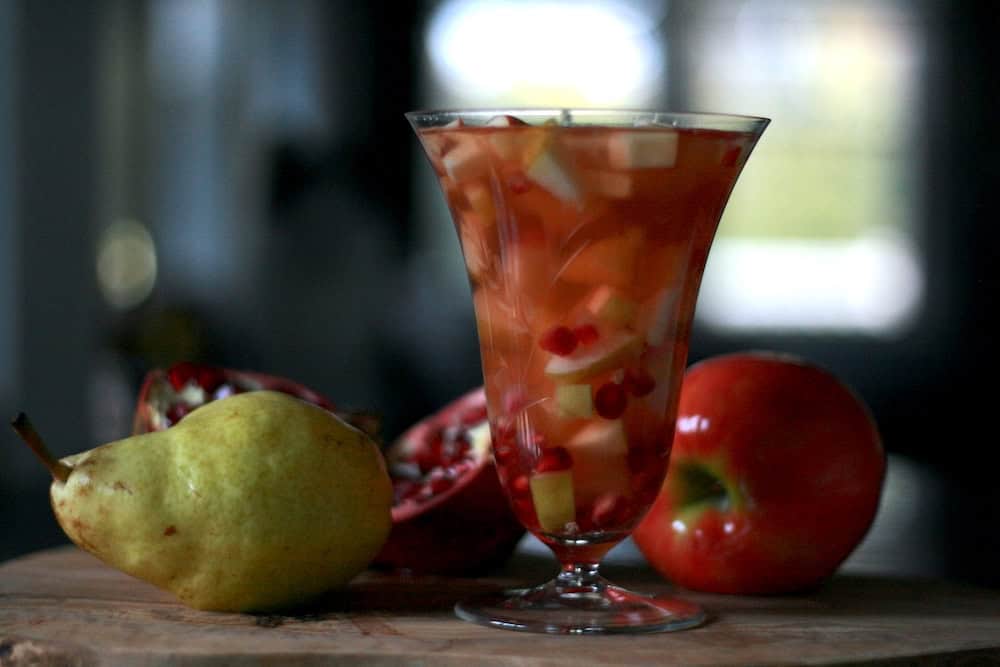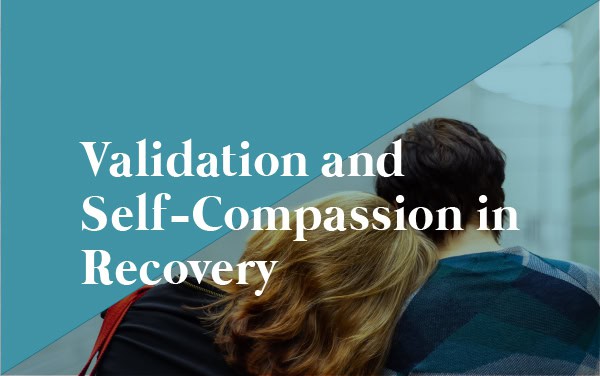
by RE Helper | Sep 15, 2023 | Alcohol Free, Blog, Early Sobriety, Healing, Helpful Tips, The first Year
Today’s blog entry is from Amanda McLean, who has been a member of Café RE since November 2019. Amanda has been alcohol free since March 26, 2019 and is very active within her Café RE GO community.
“Another day one, I’m such a loser.”
“I’ve ruined everything.”
“I’ll never get sobriety to stick.”
In my journey with alcohol abuse and recovery, these are just a few common mantras that run through my mind. I am someone who chronically struggles with self-judgment and negative self-talk. I know that my inner critic can be harsh and unforgiving. Since our thoughts drive our emotions, this unrelenting internal talk leads to painful feelings including anxiety, sadness, and low self-esteem. For many people, this self-hatred inner monologue and the associated feelings can lead to relapse or other forms of damaging behaviors. In my personal recovery journey, I have learned that being kind and supportive to myself during times of suffering is critical in maintaining my sobriety in recovery.
Avoidance is the Enemy
As Paul states in Recovery Elevator Episode 274 – I Feel Your Pain “In order to shift stagnant energy inside of us, we have to talk about our emotions.” Avoiding our thoughts and feelings never ends the way that we hope it will. And experts agree that one of the contributing factors to addiction is avoidance. As a person in recovery, I am guilty of minimizing, invalidating, and negating my feelings. But the more we avoid distress or attempt to suppress it, the worse it becomes. The more energy we use to push emotions like anxiety or anger away, the more powerfully those emotions come back toward us.
Another disadvantage of avoidance is that our bodies interpret avoidance as proof of danger, and this signals our internal alarm system. When my internal alarm system is activated, I often crave something to soothe my nervous system. Historically, I used and abused alcohol to calm my painful emotions. Although this solution proved to be immediate, it came with long term undesirable consequences including more painful emotions and negative self-talk. And thus, the cycle continued.
Start with Validation
Rather than avoiding negative self-talk and painful feelings that we would rather not face, we need to make a shift. We need to remember that the thought and the feeling are not the enemy. We need to remind ourselves that our thoughts and feelings are allowed to be here. We can tolerate discomfort. This starts with noticing the thought and/or the feeling and then providing validation.
Validation is useful for addressing any uncomfortable thought or feeling. It starts with acknowledging or labeling the feeling. For example, “I feel like I fail at everything, and this feels rough” or “I feel like I can’t do anything right and my entire body is tense” or “My chest feels tight and I feel so anxious”.
Once we acknowledge what we are feeling, we can then tell ourselves why it makes sense that we feel this way. In other words, tell yourself the story about why it makes sense that you feel the way that you feel. For example, “It makes sense that this feels rough because I worked a long day and now I am cooking dinner for my family while my kids argue”, or “It makes sense that I feel like I can’t do anything right and I am tense because my boss just snapped at me”, or “It makes sense that I am feeling anxious because this is my daughter’s first day at her new school and I am scared she won’t make friends”.
Self-Compassion
I know that feeling. That feeling of shame. When I was abusing alcohol, I didn’t want anyone else to know the things I had done. This is exactly when we need self-compassion. Self-compassion reminds me that I made a mistake but that does not mean that I am fundamentally a bad person. I can separate my worth as a person from my behavior.
When I fail to validate and hold my feelings, when I shame myself, I cannot learn from my mistakes. Shaming myself through self-judgement and self-criticism shuts down the learning receptors in the brain. Shame freezes a person. Self-compassion allows me to acknowledge and validate my thoughts and feelings, commit to not making the mistake again, and then forgive myself.
Dr. Kristin Neff, a pioneer in the field of self-compassion research, states that self-compassion is acting toward yourself the way you would act toward a cherished friend when you are having a difficult time, when you fail, or when you notice something that you don’t like about yourself. When something goes wrong or we have a difficult moment, avoiding or fighting against the suffering in that moment will only increase our anxiety, distress, and self-criticism. Self-compassion is a method for soothing or comforting our nervous system.
The 3 steps of Self-Compassion
When I was at the height of my alcohol abuse, waking up each morning feeling like a failure, the most common self-criticism that I heard in my head was, “I am such a loser”. More often than not, self-criticism caused me significant distress which led me to soothe my system with alcohol. In recovery, I have learned the value of self-compassion: giving myself kindness, care, and support.
Self-compassion involves three steps. First, I must hold the pain of my mistakes. This takes a lot of courage because I must acknowledge the pain I have caused myself and others. Second, I remember that pain and suffering are a part of being human and therefore other people have felt this way as well. I am not alone. Third, I must be kind to myself. Self-kindness means that I treat myself with sympathy, warmth, and patience.
Practicing these three steps may sound like, “I drank again and I was not present for my children and my husband. Other people struggle with repeated mistakes, and I am not the only person who has felt and experienced this pain. I have been through a lot this year and quitting alcohol is hard. AND I can do hard things.” From that space of openheartedness, I can do everything I can to commit to doing it differently in the future. This allows me to soothe my nervous system without using or abusing a harmful substance.
***By Amanda McLean; Café RE Go Group
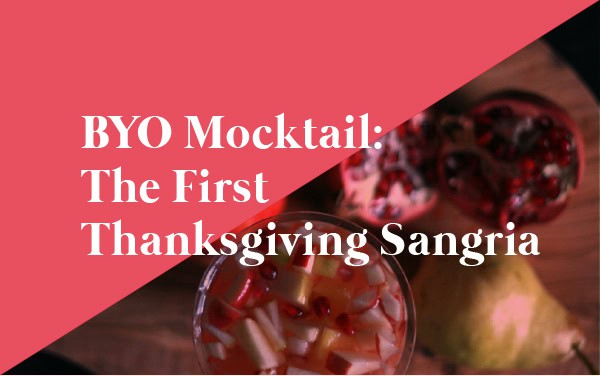
by RE Helper | Nov 15, 2021 | Alcohol Free, Blog, Holidays, Mocktail, Recipe, The first Year
Hello again all!
We are starting that descent into the holiday season which can often cause anxiety for those of us in sobriety. No matter how much time you have there can be triggers everywhere that threaten to derail you.
First up: Thanksgiving.
For all my Canadian Sober friends, yes I know REAL Thanksgiving was last month.
I quit drinking in August of 2018 and pretty much on October 1st of that year I started panicking about what I was going to do for Thanksgiving. My husband Jay and I spend Thanksgiving with his family, and it was always filled with wine, specialty cocktails and after-dinner shots. That year was different, I had been trying to get sober for 2 years and the determination I had for this round of sobriety felt stronger.
So, I turned to my favorite place on the internet… Pinterest. Frantically searching for the best mocktail that looked enough like an alcohol-filled cocktail that no one would really ask too many questions. I wasn’t ready yet to talk about the fact I had quit drinking, so my plan was just to fake it for a little bit longer. There were so many different recipes for Sangria! Taking ideas from a few recipes, my own imagination and taste buds, I created Sangria minus the booze.
I wish I could go back and tell Past Kate that it would be ok and that no one really cared what I was drinking, they were just focusing on what they were drinking on Thanksgiving. That first holiday, I’m pleased to say, for me was a success. When my sister-in-law asked “What are you drinking?” I confidently replied “Sangria!” and I didn’t have to lie.
Today I’m giving you The First Thanksgiving Sangria.
The First Thanksgiving Sangria (AF)
Serves 8
Prep time: 15 minutes
Ingredients
- 2 medium apples, diced
- 2 medium pears, diced
- 2 medium oranges, skins removed, roughly chopped
- 3/4 cup pomegranate seeds
- 4 cinnamon sticks
- 2 cups brewed green citrus tea (cooled) *
- 1 750 ml bottle non-alcoholic sparking apple cider
Using a large pitcher, add the fruit, cinnamon sticks, and tea.
Stir to combine and refrigerate for at least 4 hours.
Pour into your favorite fancy glass, adding the sparkling cider as a topper to taste.
*I used this tea.
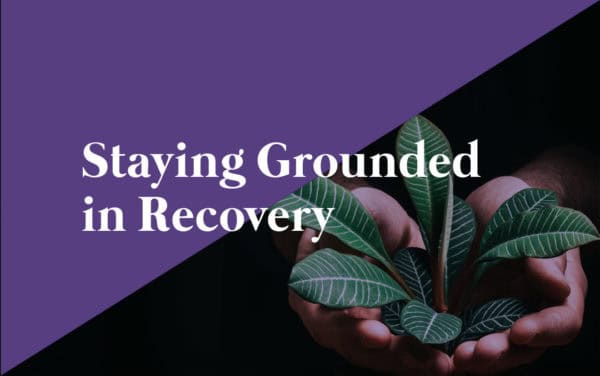
by Kerri MacFarlane | Oct 15, 2021 | Blog, Early Sobriety, Helpful Tips, The first Year, Uncategorized
What do you do when you get a craving? When you’re in that moment and your next move may decide whether you pick up a bottle, or not. And how do you feel when you’re in that moment?
For example…I feel anxious, I feel panicky and I feel nervous.
In a recent therapy session I shared with my therapist that since my recent relapse I have been noticing I am having more frequent moments of feeling anxious and feeling cravings come up. I don’t know if these feelings are really more frequent or if I am just paying closer attention now…but regardless, the feelings are there either way. (Side note – Back to 72 days alcohol free as of this writing!),
She asked me what I do when these feelings come up? Did I know what grounding was, did I use any grounding techniques or grounding exercises when I was “in” those moments?
I know what being grounded is…I was grounded a lot while growing up. ? And I’ve heard the term grounding used with earthing…walking around outside barefoot, which I also do a lot of. But she was talking about something else.
She gave me some grounding techniques that I had never heard of…that I could do anywhere, at any time. I’ve used these…and I have found them helpful. They help me turn my attention away from my anxious mind and off the craving…help me refocus on the present moment. And help me move into the next hour sober. I’m going to share some of them with you and maybe you will find them helpful as well. ??
The 5-4-3-2-1 Grounding Technique (or the 5 Senses Technique)
Our physical body is how we interface with the rest of reality, the five senses like tethers anchoring us to the moment.
- Look For 5 Things You Can See: Look for the small details, the wood grain on the desk in front of you, the pattern in the ceiling. Become aware of the glossy green of the plant in the corner. Take your time to really look and acknowledge what you see. Maybe look for something that you may not have noticed before.
- Become Aware Of 4 Things You Can Touch/Feel: The clothing on your body, your cotton shirt against your neck. The warmth of the sun on your skin. The wind blowing through your hair. The chair you are sitting on. It may help to vocalize these…”I feel the wind blowing through my hair, I feel the warmth of the sun on my face.”
- Acknowledge 3 Things You Can Hear: Pay special attention to the sounds your mind has tuned out. Don’t judge, just hear. The distant traffic. The ticking of the clock. The roosters outside. (I’m in Hawaii as I write this, there are a lot of roosters outside. ?) The voices in the next room.
- Notice 2 Things You Can Smell: Try to notice smells in the air around you, like an air freshener or freshly mowed grass. If at first you don’t feel like you can smell anything, simply try to sense the subtle fragrance of the air around you, or of your own skin.
- Become Aware Of 1 Thing You Can Taste: I suggest carrying snacks for this step…because, snacks…duh. Pop one in your mouth and focus your attention closely on the flavors.
Repeat, repeat…as many times as needed. ??
Another grounding technique she shared with me was like playing a game of “categories” with yourself.
Pick a category (types of dogs, fruits and veggies, cereals, jazz musicians, animals, famous people, cars, TV shows, writers, sports, songs, cities, etc.) and name as many items in the category that you can think of. For a variation name the items alphabetically or try to name an item in the category that begins with each letter of the alphabet. This can also be a great game to keep kids preoccupied in the car!
For some more grounding techniques Paul shared some of his here.
Like I said in the beginning…I had a recent relapse. Weirdly I feel alright about that. I have found these quick and easy grounding techniques to be very helpful for me at this stage of my journey. I hope that they may help you too.
If you have any that you use and would share, please drop them in the comments!
Until next time, be well.
Kerri Mac ?
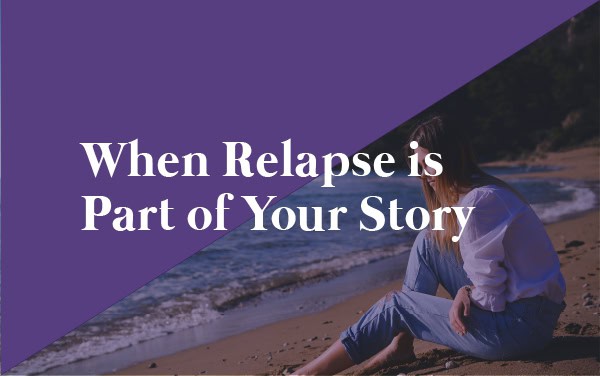
by Kerri MacFarlane | Aug 15, 2021 | Alcohol Relapse, Blog, Early Sobriety, The first Year
I saw the following quote about relapse on Instagram the other day. When I first read it I thought, ‘gross!’, and scrolled on. Throughout the day the quote kept coming back to me though…perhaps because I have 3 dogs that are often doing gross things. But the more I thought about it, the more I agreed with it.
“It is the return of a dog to his vomit.”
― Paul Verlaine
Relapse IS kinda like the return of a dog to his vomit. ?? But it is more than that, much more.
In its simplest terms, a relapse is when you start drinking again after a period of abstinence.
I think relapse is one of the scariest words for people in recovery. But it is also a very normal part of the recovery process…and it does not mean you have failed. If you have listened to the Recovery Elevator podcast or are part of our Café RE community you have probably heard the term ‘field research’. Many of us use that term in place of the word ‘relapse’. Some people, such as Paul Churchill, feel that the word ‘relapse’ is another word in recovery, similar to the word ‘alcoholic’, that needs to be thrown out. Paul talks more about that here.
Alcohol is one of the most commonly ingested substances in the world. The 2019 National Survey on Drug Use and Health found roughly 16 million Americans were heavy alcohol users, and 14.5 million Americans had an alcohol use disorder. Stress, anxiety and isolation caused by the Covid-19 pandemic have worsened these numbers.
Over 30% of people who attempt to stop drinking relapse in their first year of sobriety, but that rate does go down over time. After 5 years that number has dropped to 9.6%. I left out a lot of the statistics, but the bottom line is more than 70% of people struggling with alcohol abuse will relapse at some point.
That doesn’t mean they won’t get back on that wagon and succeed.
I’ve heard people say that the relapse starts way before you actually pick the drink back up, the relapse itself does not occur all at once. I don’t think that anyone plans for, or intends for a relapse to occur. But they do happen, and they happen in stages.
“Stressing about a relapse happening only leads to a release happening.”
― D.C. Hyden
THE STAGES OF RELAPSE
Experts say that relapse occurs in three separate stages — emotional, mental and physical.
- Emotional relapse: The person is not actively drinking or even thinking about drinking, but they are having thought patterns that could possibly be setting them up for a future relapse. This is also where triggers come into play. A trigger could be going to a location where you used to drink, hanging around people you used to drink with, or participating in an activity that you used to drink during.
- Mental relapse: The individual in a mental relapse is waging an internal battle. One part of them wants to remain sober, and the other part wants to drink. Once you have given yourself mental permission to pick up the drink, even for “just this one time”, it can be very difficult to hold on to your sobriety.
- Physical relapse: The individual starts to actively drink alcohol again, often resulting in, and leading up to, previous patterns of alcohol abuse.
A relapse will have you feeling guilty, ashamed and tempted to throw in the towel. But don’t! Use those feelings to get back in the saddle.
That’s what I have done (am currently doing in fact). Will relapse be a part of your story? Maybe. Maybe not. It is, however, a part of mine.
I have had a recent relapse…and it’s not my first. (God willing it will be my last! ??). I have those feelings of guilt, shame, that I’ve failed…myself and everyone else, that I’m not good enough for the people that I surround myself with. But I’m using those feelings…using them to help me do better, be better.
I can’t tell you when my relapse started…because again, it started long before I picked up the bottle. And I also can’t tell you how long it would have continued had I not been called out on my bullshit. What I can tell you is I stopped using the tools in my recovery toolbox. I can tell you I never reached out for support or asked for help…and my support circle is LARGE (something I learned after sharing I had relapsed). I won’t make those mistakes again.
I can also tell you that it feels really good to be sharing with that support circle now. ??
Today I feel good.
IWNDWYT (I will not drink with you today.)
Until next time, be well.
Kerri Mac ??
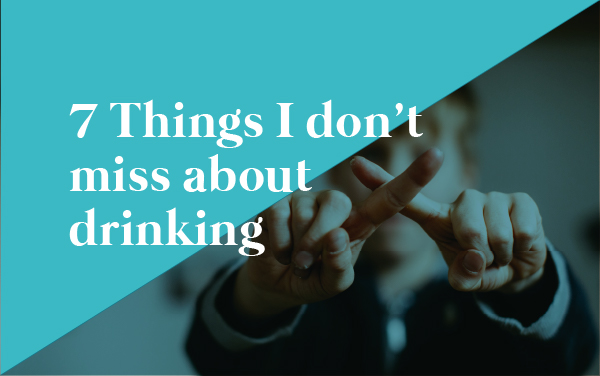
by Kerri MacFarlane | Jun 15, 2021 | Alcohol Relapse, Blog, Early Sobriety, Helpful Tips, The first Year, Uncategorized
There was a time that I was afraid to stop drinking. I was afraid that I would fail. I was scared about removing something from my life that had been a part of my life for over 30 years.
I thought drinking made me fun…so by quitting I would be boring. I would lose friends. Which in hindsight was crazy thinking since I drank at home, alone, for the last 15 or so years. I didn’t have friends…drinking friends or not. Sounds like the opposite of fun to me now.
In the beginning the thought that I would have to be ‘in recovery’ for the rest of my life was depressing and overwhelming. Was I always going to have to work so hard? Was whether or not I was drinking going to be my only real story? I now see recovery as a gift.
I am truly grateful for my recovery and being in recovery. I can now take a step back and list off things that without my recovery I wouldn’t have. Things I’ve gained. Things I’ve regained.
I can also step back and remind myself of the things I don’t miss about drinking. Here’s a few of them.
1️⃣ The hangovers. The bloody hangovers. This is probably the main thing we can all relate to and the first thing that comes to mind when someone asks you what you don’t miss about drinking. Peeling your eyelids open, the pounding headache, nausea, vomiting, dehydration, shakes, lack of energy. There was a time that was my everyday routine. I would either sleep the day away, finally starting to feel human again later in the afternoon…when I would start drinking again. Or I would have a couple shots early in the morning to help get me through the day. My motivation and productivity was at zero. I don’t miss the hangovers.

2️⃣ The blackouts. Waking up and checking my phone in fear…when I could find my phone. Who did I talk to? What did I say and do? Not having a conversation the next day because I very well already had the conversation the night before and don’t remember. Playing detective the next day. I was a blackout drinker from day 1. I don’t miss blacking out.
3️⃣ The anxiety, the shame and regret. 3:00 am was the worst. I would get up and drink…if I could find the bottle I hid…just so I could fall back asleep. I never really thought I had anxiety until I stopped drinking and it went away. I don’t miss not sleeping properly, I have never experienced sleep like I have since I quit drinking alcohol, it really is incredible. I don’t miss the anxiety, the shame and regret.
4️⃣ Apologizing…over and over…again and again. It’s true that action speaks louder than words. But I truly was sorry that I drank, again. I truly was sorry that I said I wouldn’t, but I did. I don’t miss sounding like a broken record with the apologies.

5️⃣ Always thinking about alcohol. I don’t miss thinking about alcohol all the time. Have I got enough? Should I go and get some more? What if it runs out? Is it too early in the morning to go buy more? The mental energy spent when drinking is exhausting. I don’t miss always thinking about alcohol.
6️⃣ The harm to my health and physical appearance. My skin looked like shat. I had bags under my eyes. I looked years older. I ate junk food in excess. I had high blood pressure. I couldn’t sleep. I had no energy. When you’re actively drinking you don’t necessarily realize the toll it’s taking on your body, or you just don’t care. But when you remove alcohol, it becomes pretty obvious how it was affecting you physically. I don’t miss harming my health and good looks. ?
7️⃣ Disappointing the people I love, disappointing myself. Not to say that after ditching the booze I never disappointed the people I love or myself again. Because that is just not true. I am human after all. But I can say I stopped the groundhog days of doing it. And once I was able to let go of the shame I was able to believe that I am not a failure because of my failures. And I was able to start rebuilding relationships…the most important one being the one with myself. I don’t miss repeatedly letting those I love down.
There’s more I could add…but I’ll stop there. I feel the longer I am in recovery the longer my list will get. Some days it is easy. Other days I have to use more of my tools. It’s not saying no to alcohol, it’s saying yes to a better life. And there are wonderful things on the other side…you just have to trust yourself you CAN get there.
But it really is worth it.
Until next time, be well.
Kerri Mac ??
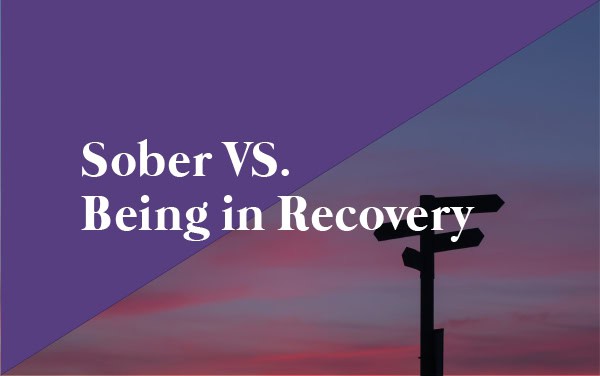
by Kerri MacFarlane | Apr 18, 2021 | Alcohol Relapse, Blog, Early Sobriety, Expectations, The first Year, Uncategorized
“I’m sober.”
“I’m in recovery.”
Two statements that very often get interchanged. If you think they mean the same thing, think again. There is a distinct difference. Being sober is very different from being in recovery. You can be one or the other…or you can be both.
Choose both.
What Is Sobriety?
When you have eliminated alcohol from your life you are deemed “sober,” and although sobriety is part of recovery, sobriety alone is often a temporary and fragile state. Think of the terms “white knuckling it” and “dry drunk”.
White knuckling your sobriety means you are trying to manage your addiction without help. You are using your will power or trying to fix yourself with your mind.
A “dry drunk” is someone who is sober but is struggling with the emotional and psychological issues that led them to have a problem with alcohol in the first place.
Just because you no longer live under the influence of alcohol it doesn’t mean that other unhealthy aspects of your life have changed. For example, you may still have poor or damaged relationships, behavioral health issues, mental health issues, or emotional issues that need to be addressed.
Sobriety is considered to be the natural state of a human being at birth. A person in a state of sobriety is considered sober.
What Is Recovery?
There is no “standard” definition of “recovery” in the addiction community, and part of the reason why is because everyone’s recovery journey is unique. ??
According to SAMHSA, recovery is “a process of change through which people improve their health and wellness, live self-directed lives, and strive to reach their full potential.”
A person in recovery is continually making an effort to work through the issues that caused the alcohol abuse to occur in the first place.
In recovery is a powerful period because beyond everything else, it signifies that you know you have a problem and you are trying to fix it. Recovery allows you to make positive changes and deeply examine your feelings, beliefs and behaviors. Recovery does not mean you fix your issues right away. It means you recognize something is wrong, which is the first step and a critical part of getting help.
People in recovery have the greatest chance of maintaining long-term sobriety. Better yet, they have the opportunity to live a happy and productive life that is free from addiction.
I love this list that Odette shared on the podcast, episode 316…titled the same as this blog…”Sober” VS “In Recovery”.
When you are in Recovery, you:
- Feel a kinship to those who are also in Recovery. (SO true!)
- Make decisions based on how it could impact your Recovery. (“My recovery must come first so that everything I love in life does not have to come last.”)
- Adjust friendships and relationships based on how they could affect Recovery. (BOUNDARIES!!)
- Never let down your guard. (I don’t got this!)
So, can you be sober and not be in recovery? Absolutely! And although you can achieve a state of sobriety with simply abstaining from alcohol, with time, you will come to find that the life you want comes not just from being sober but from entering into the recovery mindset. ?
And you know what the cool thing is? You don’t have to be an alcoholic to live in this mindset. ? The mindset that allows you to grow and develop your self awareness, the mindset that allows you to see beyond the surface and question many things in life like relationships and boundaries. That mindset is for everyone.
Once I got past the early days of sobriety I started thinking of my sobriety journey as my recovery journey. I realized that it was about SO much more than just ditching the booze. That the recovery process is one of ongoing healing and that there is no part of my life that my recovery doesn’t touch.
I also learned that it is rarely accomplished alone. I wanted to be around others ‘in recovery’. Not just because they were sober and could relate to that part of my life. But because they want to grow, want to learn, want to be better.
Transitioning from sobriety to recovery takes both commitment and action.
If you are a grey area drinker or someone who doesn’t even know if they belong here because you are not alcoholic enough…I hope you know that recovery is for EVERYBODY.
E V E R Y B O D Y.
You have your seat at this table, no matter what.
Until next time, be well.
Kerri Mac ??



